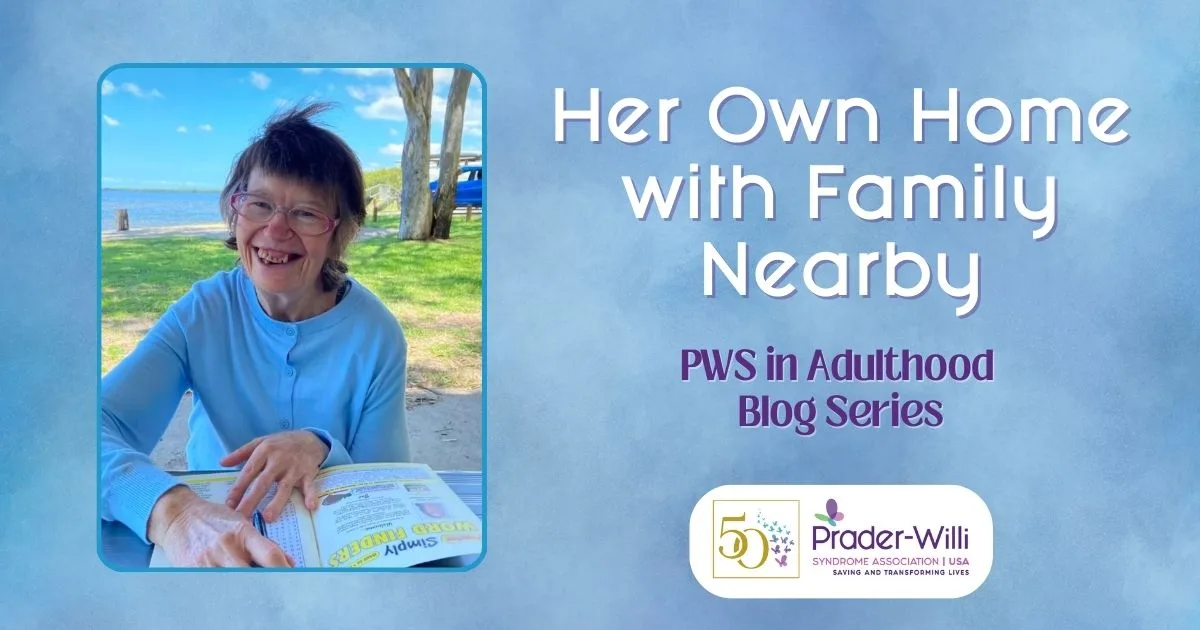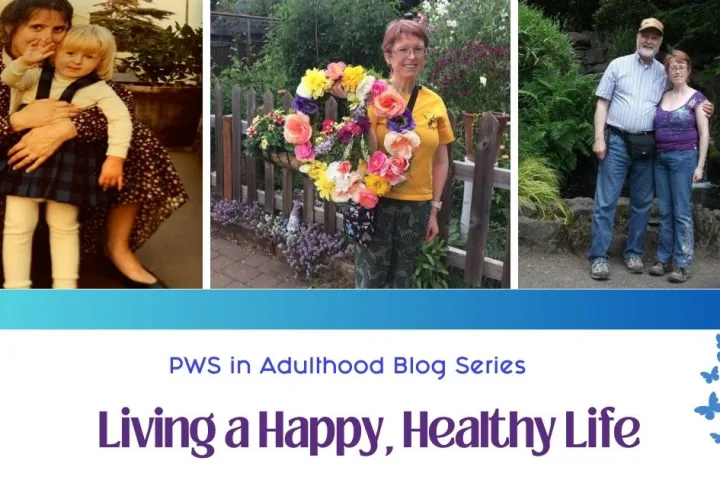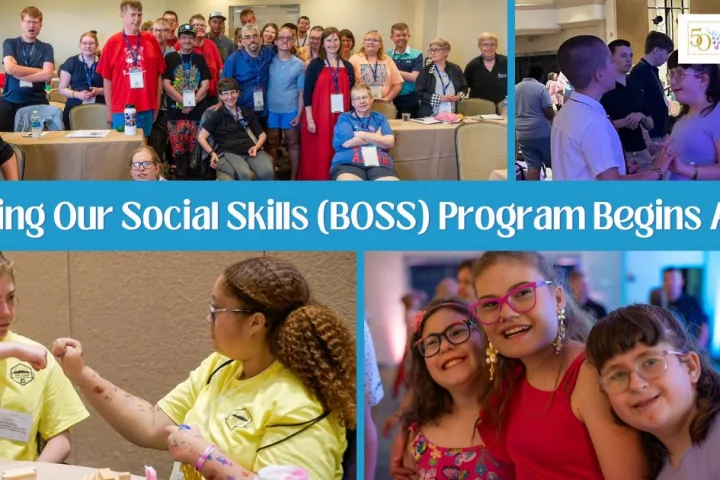submitted by Lisa, Julia’s twin sister
Julia is a 55-year-old woman living with Prader-Willi syndrome in Queensland, Australia.
What steps did you take to prepare for her life as an adult?
Julia secured funding through the Australian NDIS system to live Independently. We then looked for a placement that was close to family and support workers who understood PWS.
What does independence look like?
Julia cohabits with another lady who lives with disability. She has 24/7 support, and assistance with every aspect of her life. Julia has her meals delivered each week for breakfast, lunch, dinner and snacks; this service is partially funded. Because the meal delivery service ensures that Julia has portion-controlled meals she is at a healthy weight and can participate fully in community life. Julia participates in a range of activities that she enjoys, including Bingo, library visits, country music nights and gym workouts.
What supports are in place?
Julia is supported at all times by a roster of support workers. She lives with restrictive practices to ensure that she has no access to additional food, so her fridge and cupboards are locked shut and bins cannot be accessed. Julia has a specialist Behavioural Psychologist who has decades of experience with PWS and who works with Julia to get the best outcomes for her and who also trains her support team.
Romantic Relationships
Julia has only ever had a boyfriend when in high school. She struggles to maintain long term relationships, although she is very talkative and friendly with people she has just met. Julia has never shown an interest in having an adult romantic relationship.
Volunteer/Work in the Community
Julia doesn’t work but she does do some volunteer hours at a puppy rescue facility, and she really enjoys this. Julia has supervision while interacting with the animals.
Advice for Parents on Preparing for Adulthood
Start to plan when kids are entering puberty and accept that the ‘perfect’ accommodation situation might not exist, but you can find a ‘good or even a great’ option if you are persistent.
More about Julia
Living independently is life changing for people living with PWS and for their families. It means freedom to enjoy family time with PWS loved ones without the exhaustion and the responsibility of looking after them 24/7. Julia really values having her own home and her own life, while knowing that her family love her very much and are not far away.
Thank you for sharing Julia’s story with us!
Share your story by filling out the form below.
Please note that not all questions are required. We invite you to share what you are inspired to share.
Share this!





 Perry A. Zirkel has written more than 1,500 publications on various aspects of school law, with an emphasis on legal issues in special education. He writes a regular column for NAESP’s Principal magazine and NASP’s Communiqué newsletter, and he did so previously for Phi Delta Kappan and Teaching Exceptional Children.
Perry A. Zirkel has written more than 1,500 publications on various aspects of school law, with an emphasis on legal issues in special education. He writes a regular column for NAESP’s Principal magazine and NASP’s Communiqué newsletter, and he did so previously for Phi Delta Kappan and Teaching Exceptional Children. Jennifer Bolander has been serving as a Special Education Specialist for PWSA (USA) since October of 2015. She is a graduate of John Carroll University and lives in Ohio with her husband Brad and daughters Kate (17), and Sophia (13) who was born with PWS.
Jennifer Bolander has been serving as a Special Education Specialist for PWSA (USA) since October of 2015. She is a graduate of John Carroll University and lives in Ohio with her husband Brad and daughters Kate (17), and Sophia (13) who was born with PWS. Dr. Amy McTighe is the PWS Program Manager and Inpatient Teacher at the Center for Prader-Willi Syndrome at the Children’s Institute of Pittsburgh. She graduated from Duquesne University receiving her Bachelor’s and Master’s degree in Education with a focus on elementary education, special education, and language arts.
Dr. Amy McTighe is the PWS Program Manager and Inpatient Teacher at the Center for Prader-Willi Syndrome at the Children’s Institute of Pittsburgh. She graduated from Duquesne University receiving her Bachelor’s and Master’s degree in Education with a focus on elementary education, special education, and language arts. Evan has worked with the Prader-Willi Syndrome Association (USA) since 2007 primarily as a Crisis Intervention and Family Support Counselor. Evans works with parents and schools to foster strong collaborative relationships and appropriate educational environments for students with PWS.
Evan has worked with the Prader-Willi Syndrome Association (USA) since 2007 primarily as a Crisis Intervention and Family Support Counselor. Evans works with parents and schools to foster strong collaborative relationships and appropriate educational environments for students with PWS. Staci Zimmerman works for Prader-Willi Syndrome Association of Colorado as an Individualized Education Program (IEP) consultant. Staci collaborates with the PWS multi-disciplinary clinic at the Children’s Hospital in Denver supporting families and school districts around the United States with their child’s Individual Educational Plan.
Staci Zimmerman works for Prader-Willi Syndrome Association of Colorado as an Individualized Education Program (IEP) consultant. Staci collaborates with the PWS multi-disciplinary clinic at the Children’s Hospital in Denver supporting families and school districts around the United States with their child’s Individual Educational Plan. Founded in 2001, SDLC is a non-profit legal services organization dedicated to protecting and advancing the legal rights of people with disabilities throughout the South. It partners with the Southern Poverty Law Center, Protection and Advocacy (P&A) programs, Legal Services Corporations (LSC) and disability organizations on major, systemic disability rights issues involving the Individuals with Disabilities Education Act (IDEA), Americans with Disabilities Act (ADA), and the federal Medicaid Act. Recently in November 2014, Jim retired.
Founded in 2001, SDLC is a non-profit legal services organization dedicated to protecting and advancing the legal rights of people with disabilities throughout the South. It partners with the Southern Poverty Law Center, Protection and Advocacy (P&A) programs, Legal Services Corporations (LSC) and disability organizations on major, systemic disability rights issues involving the Individuals with Disabilities Education Act (IDEA), Americans with Disabilities Act (ADA), and the federal Medicaid Act. Recently in November 2014, Jim retired.